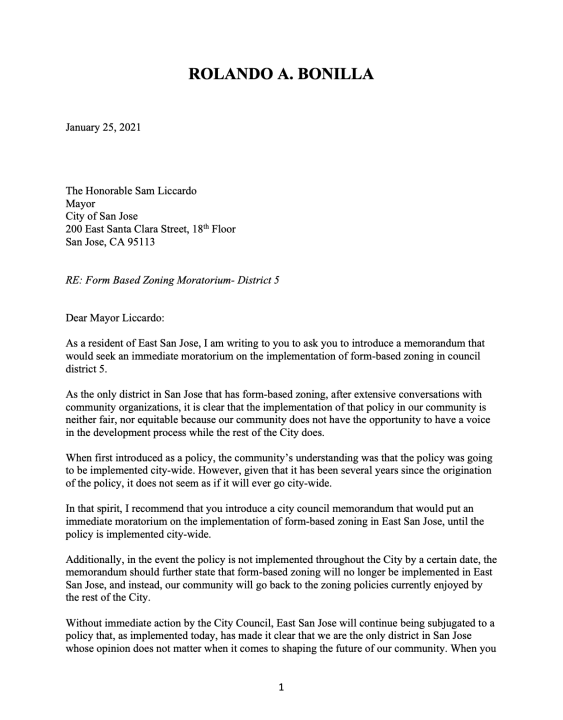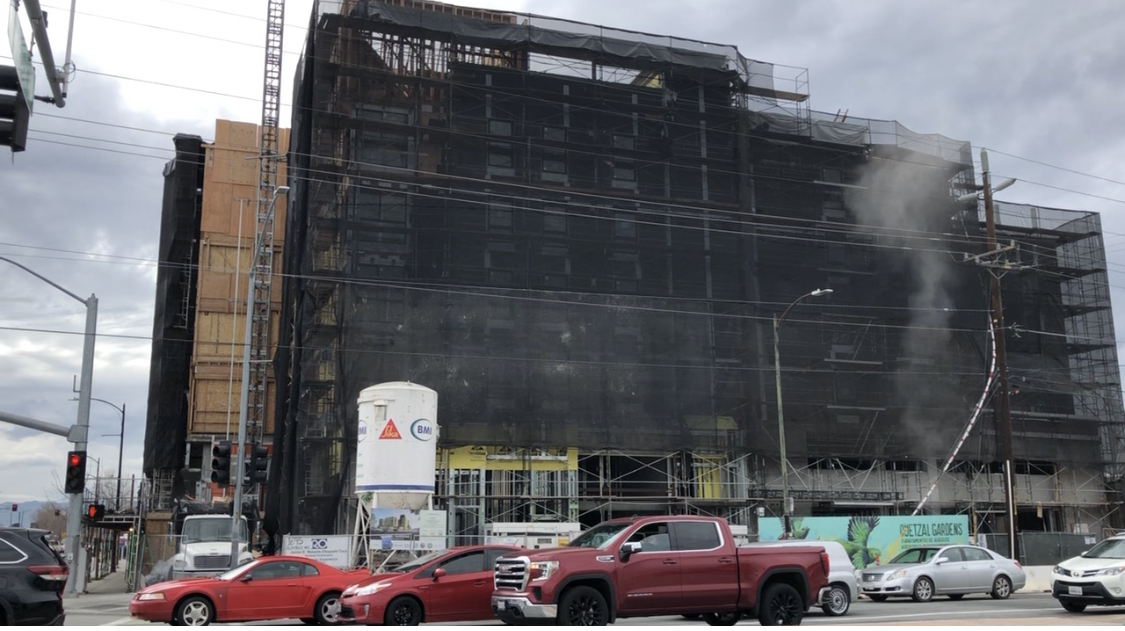SAN JOSE, Calif. (KRON) — In East San Jose, developers looking to build in the community go through a different process than other districts around the city.
Due to a special zoning policy, developers can get approved for projects in District 5 without needing a vote from the City Council or any public input.
Community leaders and advocates are now urging the city to end the policy, calling it neither fair nor equitable for the community.
“To me that’s a problem and it’s a problem that’s gone on for too long and it’s a problem in my mind that needs to be corrected,“ vice chair of the San Jose Planning Commission Rolando Bonilla said.
Bonilla recently sent Mayor Sam Liccardo a letter calling for an immediate ban on form-based zoning in East San Jose until the policy is implemented citywide.

Deputy director of the city’s planning division, Michael Brilliot, said form-based zoning was adopted through the Strong Neighborhood Initiative in the early 2000s, which was aimed to improve underserved low-income communities.
“And the goal of that process was really to empower neighbors to be involved in the decision making, particularly decisions on services and budgeting in the city and developed leaders can really improve their neighborhood,” said Brilliot.
Brilliot tells KRON4 News the idea of form-based zoning was adopted to help Alum Rock attract new investors to bring in new mixed-use development.
“For me it is completely probalmic to have two sets of rules for one city because it basically sends a message out there that this side of the city, this part of the city, your opinion, your perspective matters, we want value it, we want to help you shape development conversation with us,” Bonilla said.
“Whereas on this side of the city, East San Jose, the statement coming out of City Hall through the implementation of form-based zoning is your opinion does not matter.”
East San Jose is home to a majority Latino population and advocates say they are fearful of new developments forcing residents out of the area.
Danny Garza, president of Plata Arroyo Neighborhood Association, tells KRON4 News form-based zoning is troublesome because it silences the community’s voice in the redevelopment process.
“The problem we have with form-based zoning here in the East Valley and not just District 5 but in the East Valley is coming, and what’s happening is the minorities are getting robbed,” said Garza.
“We don’t have a voice, we don’t have a choice.”
Along with other community advocates, Garza says developers are dismissing the requests for new projects to reflect the heritage and community of East San Jose.
As a result, the community and developers don’t have much communication on deciding how and what gets built in their neighborhood.

“The thing that the city has done is they called this area from 101 to Jackson an Urban Village and it’s not,” Garza said.
“If this was a true urban village we wouldn’t have the five and a half pages claiming to be an urban village when right next door on King and Alum Rock, Little Portugal has 250 pages of urban village protection,” Garza added.
“We don’t have those protections as you can see right here, we don’t have any communication and contact with this developer except for him to say, ‘hey we’re going to do it and we don’t care what you say.’”
According to Brilliot, state guidelines could make it harder for the city to stop from-based zoning policy in District 5.
“There’s a lot of state laws coming out of Sacramento over the last two or three years that are really trying to address the housing crisis and streamline the process of building housing and preclude cities from getting in the way of building housing,” said Brilliot.
“It’s not about going backwards, it’s more about going forward.”
Developers looking to build in District 5 still host public hearings on these projects but the planning director has the power to make the final decision without City Council approval.
Residents can still appeal a form-based zoning project to City Council but only after it has been approved by the Planning Commission.
But the City Council can still choose not to take any action.

Currently, there are no projects that have been constructed on Alum Rock Avenue using form-based zoning but two affordable housing projects are currently under construction and two more mixed-use projects are under consideration, Brilliot said.
In downtown San Jose there is a much more streamlined process that allows developers to build a mix of retail and housing projects relatively quickly.
According to Brilliot, developers looking to build in District 5 still host public hearings on these projects but the planning director has the power to make the final decision without City Council approval.
Residents can still appeal a form-based zoning project to City Council but only after it has been approved by the Planning Commission.
But the City Council can still choose not to take any action.
Mayor Liccardo has since responded to Bonilla’s letter and says he is open to discussing the current form-based policy in East San Jose.
“In my recent convening with Alum Rock neighborhood leaders, I conveyed that I would welcome a public hearing before the council to consider changes to, or the elimination of the form-based zoning policy, with a focus on enhancing the community’s voice in shaping development in their neighborhoods.”